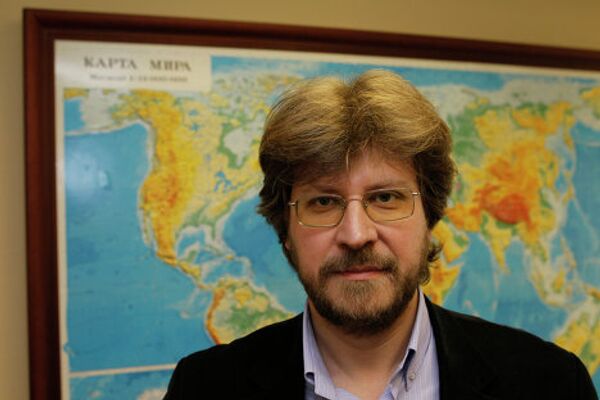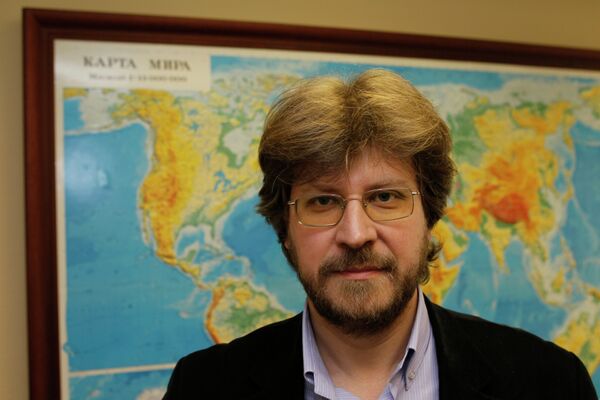In his annual State of the Union this week, President Vladimir Putin for perhaps the first time clearly articulated the philosophy that guides Russia’s leadership – conservatism.
This is hardly breaking news, but his past agenda-setting speeches and the logic behind the Kremlin’s actions testify to the predominantly conservative mentality of the nation’s leadership.

The president has now simply clarified what he understands by conservatism. Quoting the words of Nikolai Berdyayev, he argued that conservatism does not hinder progress but rather prevents regression to “chaotic darkness” and a “primitive state.”
Vladimir Putin detests chaos, as he has made clear in his writings and speeches. But this time he drew a clear dividing line: “Either [we] backslide toward the further erosion of the foundations of the world order and the triumph of the law of force – the law of the fist and greater chaos – or collectively make responsible decisions.”
In a February 2012 article by Putin’s entitied “Russia in the Changing World,” the sentiment with which he describes the world can best be summed up by the well-known axiom of the medical profession: First, do no harm.
A perplexed Putin had a simple question for leading Western countries, and the United States in particular: What are you doing? Why does every major action you take – from interfering in regional conflicts, attempting to promote democracy, or such an ambitious undertaking as introducing a common European currency – destroy the remnants of the principles on which the world order was built? It creates headaches for everyone and makes problems worse.
Whether consciously or intuitively, the Russian president proceeds from the premise that all change is for the worse. In his opinion, progress is not an end in itself but a means to stable development. If it has the opposite effect, what good is it? Why, then, is this the definition of progress?
There are grounds to criticize earlier approaches to international relations and global affairs. Some concepts have grown obsolete or ineffective in current conditions. They have undergone a truly dramatic change, but what we need is something sensible to replace them. What is offered as replacement for the good old principles does not create a framework but leads to increasingly vague interpretations, which will inevitably descend into arbitrariness and chaos.
The president used his address to emphasize the importance of tradition, a common theme in his speeches. It is understandable that the president would want to make this a source of support. Conservatism contradicts the idea of a universal world by definition. Every nation and culture is unique and values its own distinctive character above all else. In this sense, Russia’s turn to Asia is entirely logical, and not only for geopolitical or economic reasons.
Repeating this theme in his address, Putin called for elevating Siberia and the Far East to a “national priority for the entire 21st century.” The Asia-Pacific Region is probably the only region that preserves its own cultural traditions while actively participating in global processes. This fusion of a modern economy and technology with a centuries-old worldview that has deep national roots as inviolable priorities should be Russia’s goal in Putin’s opinion.
The domestic part of the address was businesslike and focused on concrete issues, whereas the foreign policy section pursued a bold claim. It follows from Putin’s words that Russia claims to represent a certain system of views in world politics that contradicts the principles that were dominant until just recently.
This is a noticeable change.
Until now, Russia’s policies were markedly devoid of ideology. Pragmatism was the ultimate goal and value.
Ideology is double-edged and binding. But in a world where images and ideas clearly play a defining role, a country that stakes a claim to a leadership position in the world cannot hope to get by on mercantilism alone or by simply rejecting foreign ideas. It has to advance an alternative. This is a risky, hit-or-miss venture, but Putin, for all his conservatism, is a risk-taker at heart.
The views expressed in this article are the author’s and may not necessarily represent those of RIA Novosti.
Is Russia unpredictable? Perhaps, but one shouldn’t exaggerate – its randomness often follows a consistent pattern. But is the world at large predictable? The past two decades have seen all forecasts refuted more than once and have taught us only one thing – to be ready for any change. This column is on what the nations and governments are facing in the era of global uncertainty.
*Fyodor Lukyanov is Editor-in-Chief of the Russia in Global Affairs journal – the most authoritative source of expertise on Russian foreign policy and global developments. He is also a frequent commentator on international affairs and contributes to various media in the United States, Europe and China, including academic journals Social Research, Europe-Asia Studies, Columbia Journal of International Affairs. Mr. Lukyanov is a senior member of the Council on Foreign and Defense Policy and a member of the Presidential Council on Human Rights and Civic Society Institutions. He holds a degree from Moscow State University.
Uncertain World: Russia’s Successes, A Likely Trap?
Uncertain World: Russia: Shifting the Focus from Europe to Asia
Uncertain World: Ukraine’s Final Declaration of Independence
Uncertain World: Russia and the Ghost of Solitude
Uncertain World: The US Internal Crisis and its Global Significance
Uncertain World: Grand Diplomacy Is Back
Uncertain World: Why Hasn’t Obama Renewed US Foreign Policy?
Uncertain World: Russia and Ukraine on the Verge of a Decisive Choice
Uncertain World: 5 Years After the 5-Day War, Everyone’s Learned Their Lessons
Uncertain World: Central Asia: An Indicator of Russia’s Imperial Aspirations

